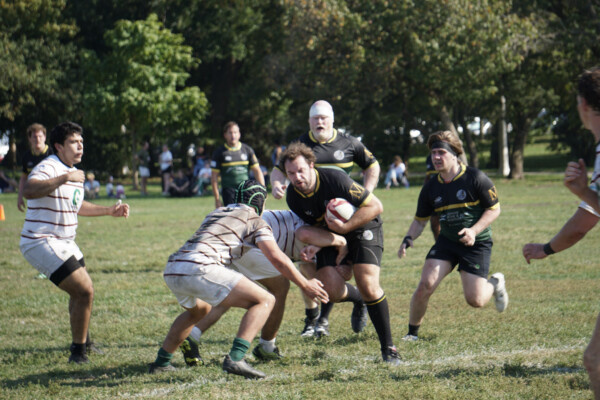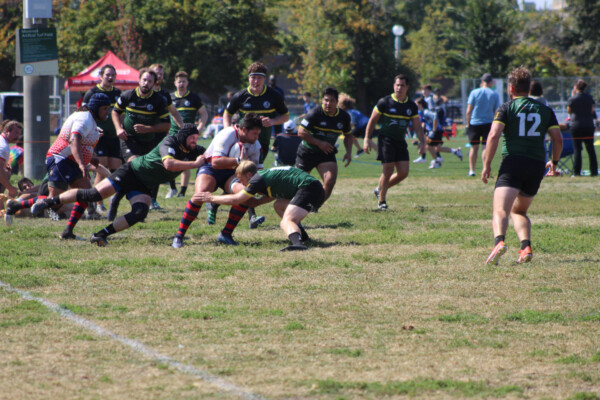
LPRFC D4 35 Eau Claire Orcs 7
The Tale of the Wisconsin Field: A Contest of Valor
Behold, in the cold northern reaches, upon the hallowed grounds of the Wisconsin Rugby Sports Complex, a great contest of strength and skill was joined. In the chill autumn air, where breath became mist and the temperature spoke of winter’s approach, two mighty hosts assembled upon the crowned fields for a D4 Semi-final—a trial that would determine which fellowship of warriors would earn passage to the final reckoning.
On one side of the battlefield stood the formidable host of Eau Claire, fearsome warriors who in this chronicle shall be known as the Orcs—grim of purpose and mighty in their resolve. Against them arrayed the proud company of Lincoln Park, steadfast and undaunted.
The Opening of Battle
The contest began with the clash of mighty warriors and the thunder of colliding shields. Great were the impacts, and the very earth seemed to tremble beneath the combatants’ feet. For a time, neither host could gain dominion over the other, as the Orcs met the men of Lincoln Park with a defense as unyielding as the roots of mountains. The struggle hung in balance, neither side yielding ground.
But as all things must change, so too did the tide of battle. At last, a breach was made in the Orcs’ defenses. A chieftain among the men of Lincoln Park, one Adam Cooley by name, perceived a path through the enemy ranks and with great cunning and speed, broke through their lines. With triumph he touched the ball to earth, drawing first blood in this epic struggle. The kick that followed flew true as an arrow, and thus the tally stood at seven points to none.
The Turning of Fortune
Though sore pressed, the Orcs did not surrender hope. From their ranks arose a warrior of notable swiftness, Trent “Beans” Julius by name, who with the keen eye of an eagle spied his chance. He intercepted a pass meant for his foes and bore down upon the line with all speed, victory seeming within his grasp.
But fate is a fickle mistress, and his hope was dashed ere it could be fulfilled. From the host of Lincoln Park came Oscar Hustlebee, who unleashed a tackle of such skill and desperation that it has been remembered as “try-saving”—a deed that cast the Orcs’ hope into ruin and preserved his company’s advantage.
Ere the great horn sounded to mark the midpoint of battle, the warriors of Lincoln Park breached the Orcs’ defenses twice more in fell succession. First came Murphy Swansy who with power and determination drove through the line and planted the ball beyond the defenders’ reach. Then followed Frankie Geiser who likewise found his way to glory.
As the companies withdrew to take counsel and recover their strength at the interim, a shadow of doubt lay heavy upon the Orcs. The score stood at one-and-twenty to naught—a grievous deficit. Their set pieces, particularly the line-outs upon which much hope had been placed, had failed them in their hour of greatest need.
The Second Half: Valor and Despair
When battle was rejoined after the respite, the host of Lincoln Park struck with the swiftness of hunting hawks. Scarce had the warriors returned to the field when Harry “Crunch” Church, so named for the force of his collisions, burst through the Orcs’ defenses like lightning splitting an oak. He crossed the line and scored, adding to his company’s dominance.
Swift upon his heels came Fran “the man” McCann, who added yet another five points to the mounting tally. The reckoning now stood at five-and-thirty to nothing—a chasm vast and seemingly insurmountable.
The Last Stand of the Orcs
Yet in their darkest hour, the hearts of the Orcs did not break, nor did their spirits fail them. Though defeat seemed certain, they summoned from deep within themselves a final reserve of strength and courage. With renewed vigor and great determination, they drove forward like a tide of fury, their battle cries echoing across the field. They showed the same fierce resolve that had brought them to this contest, refusing to yield without leaving their mark upon the day.
Through sheer will and the coordination of their assault, they at last breached Lincoln Park’s defenses. Their warrior Nate Kalisad broke through the shield-wall of defenders and touched the ball down for their first—and as fate would have it, their only—score of the day. A great cry of triumph went up from the Orcs and their supporters, for though the battle was all but lost, they had proven their worth. The kick sailed true between the posts, and the score stood at five-and-thirty to seven.
The Final Reckoning
Though they fought on with all the vigor that remained to them, striving mightily until the very end, the mountain they must climb proved too steep, the gap too wide to bridge. The final horn sounded—a long, mournful call that echoed across the field and signaled the end of the contest.
When the echoes faded and silence fell upon the Wisconsin grounds, it was the host of Lincoln Park who stood victorious, having prevailed by a count of five-and-thirty to seven. They had earned their passage to the final trial, there to test their mettle against whatever foe awaited them.
Thus ends the tale of this D4 Semi-final, a contest that shall be remembered for the valor shown by both companies—the victorious Lincoln Park, who dominated with skill and coordination, and the Orcs of Eau Claire, who though defeated, fought with honor until the bitter end.
So it was, and so it is recorded in the annals of Wisconsin rugby.


